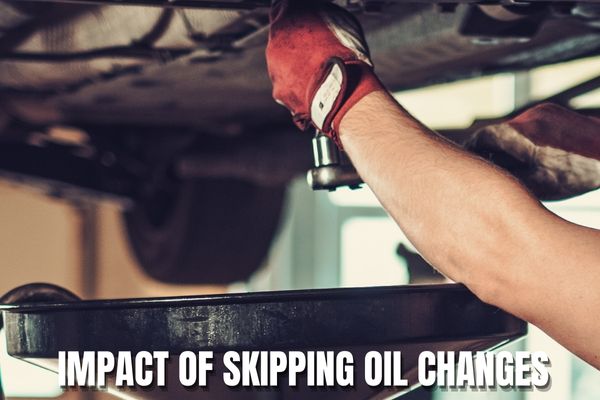Let’s be honest—most of us have probably delayed an oil change at some point. Life gets busy, and it’s easy to ignore that little sticker on your windshield reminding you it’s time. But have you ever wondered what really happens when you keep skipping oil changes? Spoiler alert: It’s not good.
The impact of skipping oil changes goes beyond just missing a routine task—it can mean costly repairs, engine failure, and even a ruined car. Let’s dive into why oil changes are so important and what happens when you neglect them.

1. Your Engine Wears Out Faster
Think of motor oil as your engine’s lifeblood—it keeps everything running smoothly by reducing friction between moving parts. When oil breaks down, it loses its lubricating properties, which means metal components grind against each other. This will really wear down your engine and make it die sooner.
2. Your Engine Could Overheat
One of the oil’s key roles is to help cool your engine by reducing friction and carrying away heat. Old, dirty oil can’t do this effectively, which can lead to your engine running hotter than it should. If it overheats, you could face warped components, blown gaskets, or even a complete breakdown.
3. Sludge and Debris Build Up
When you don’t change your oil, dirt, and debris start to accumulate. Over time, this turns into thick sludge that clogs engine passages and reduces oil flow. That means even less lubrication and even more damage. Imagine thick sludge blocking the oil pathways in your engine. This will starve critical parts of oil, causing a major problem—engine failure.
4. You’ll Spend More on Gas
The impact of skipping oil changes doesn’t just affect your engine—it hits your wallet too. When your engine isn’t well-lubricated, it has to work harder, which means it burns more fuel. Poor oil quality can lower your fuel efficiency by as much as 15%, causing you to spend more at the gas pump.
5. Worst Case Scenario: Engine Seizure
If you keep putting off oil changes, the damage eventually adds up. The lack of lubrication and buildup of sludge can cause your engine to seize completely. At this point, you’re looking at either a costly engine rebuild or replacing your car altogether—both of which are significantly more expensive than a simple oil change.
6. You Could Void Your Warranty
Many car manufacturers require regular oil changes to maintain warranty coverage. If you skip them, you could void your warranty, meaning any repairs that would have been covered are now coming out of your pocket.
7. Your Car Pollutes More
Old, degraded oil increases your car’s emissions. A poorly maintained engine burns fuel less efficiently, leading to higher carbon emissions. By keeping up with oil changes, you help reduce your vehicle’s environmental impact.
Real-Life Examples of Skipping Oil Changes
Let’s look at a couple of real-world cases where people skipped oil changes—and paid the price.
Case Study: Engine Failure from Sludge
A driver ignored oil changes for 20,000 miles. By the time they brought their car in, the engine was completely gummed up with sludge, blocking oil flow. The result? A seized engine that needed a full replacement, costing over $6,000. If they had spent $50 on an oil change every few months, they could have avoided the disaster.
Case Study: Decreased Fuel Economy Hurting Business
A small delivery company neglected oil changes for their fleet. Over time, they saw a 15% drop in fuel efficiency. After finally catching up on maintenance, they saved thousands in fuel costs. A simple oil change schedule would have prevented the unnecessary expense.
Frequently Asked Questions
Here are some answers to common questions about oil changes:
How much does an oil change typically cost?
Oil change prices vary, but conventional oil changes usually cost between $35 and $75, while synthetic oil changes range from $65 to $125. Considering the potential cost of engine repairs, it’s a small price to pay.
Can I change my car’s oil myself?
Yes! If you have the right tools and knowledge, you can change your oil at home. Just be sure to dispose of the old oil properly at a recycling center.
What happens if I overfill my engine with oil?
Too much oil can create excess pressure, leading to leaks, foaming, and even engine damage. If you’ve overfilled, drain the excess oil to avoid problems.
Is synthetic oil better than conventional oil?
Synthetic oil offers better protection, lasts longer, and performs well in extreme temperatures. While it costs more upfront, it can extend oil change intervals and improve engine longevity.
Can I switch from conventional to synthetic oil?
Yes, but always check your owner’s manual to ensure compatibility. Some older engines may require adjustments before making the switch.
Why the Impact of Skipping Oil Changes Isn’t Worth the Risk
Skipping oil changes may seem like no big deal, but the consequences add up quickly. You risk damaging your engine, spending more on repairs, and even having to replace your vehicle prematurely. Plus, the financial impact—from decreased fuel efficiency to voided warranties—isn’t worth the few bucks you save by skipping maintenance.
The good news? Keeping up with oil changes is one of the easiest and most effective ways to keep your car running smoothly for years. Set reminders, check your oil regularly, and don’t wait until you have a serious problem to take action.
Related articles:
